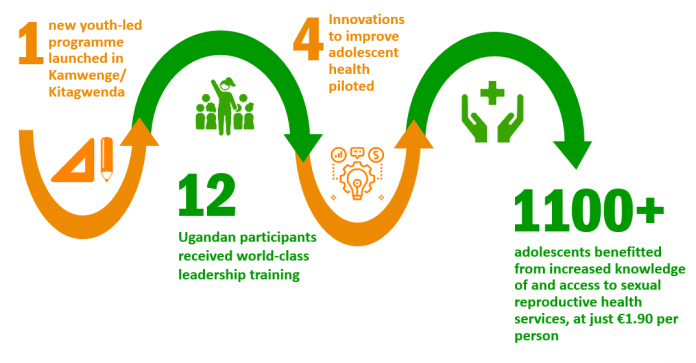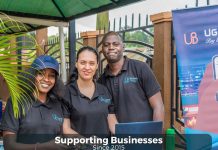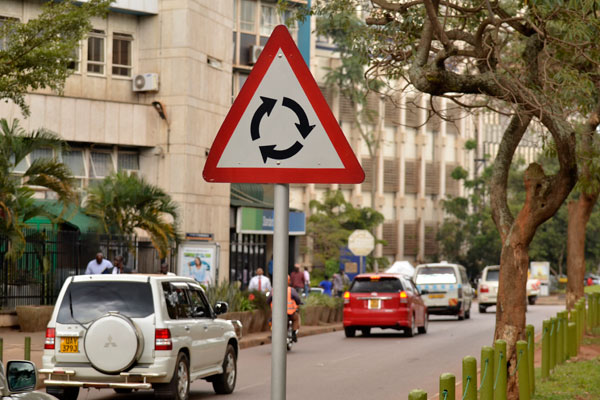When he is not out on a community outreach calling out to young people through a megaphone or placard on how to take charge of their reproductive health, Emmanuel Kateregga 22, spends time in the UNFPA Innovations Cafe (i-Cafe) which has become a resourceful setting for young people to brainstorm on how to find innovative approaches to address their sexual and reproductive health needs.
“Almost every day, we meet young people, in and out of universities, coming up with innovations in areas like lifestyle, travel, e-learning and games. But rarely do they think of innovations in the area of reproductive health. It’s time we advocates start thinking the same way,” Kateregga explains.
An initiative of the UNFPA Uganda Country Office, the i-Cafe is dedicated to giving young people like Kateregga space to think and generate ideas on how to find solutions to their reproductive health needs. Through this approach, young people are more involved in the design, planning and implementation of programmes that target them.
One of the hacking teams during the HackForYouth Hackathon. Credit: Reach A Hand, Uganda
Today, young people in Uganda today face a wide range of reproductive health challenges. This include lack of access to reproductive health and services which could inform them on how to make the right choices for their health. As a result, teenage pregnancy stands at 24% with one in every four girls being pregnant or having had a first child by the age of 19 as reported by the Uganda Demographic and Health Survey (UDHS, 2011). Still, less than 40% young people in Uganda have access to the right information on HIV/AIDS.
But young innovative minds are not sitting back. They have opted to use the accessible and available technology options to take charge of their health.
“Today, young people are the most virtually connected and computer-literate generation in history. Leveraging on new technologies has the potential to significantly change young people’s lives by making SRHR communications easier than ever before,” Kateregga says.
To drive innovation in reproductive health for young people further, UNFPA has undertaken several interventions. In partnership with Reach a Hand, Uganda (RAHU) and Massachusetts Institute of Technology (MIT), UNFPA Uganda organized the Hack4Youth hackathon that brought together tech-savvy young people from different spheres of the globe who were tasked to develop mobile tech solutions to help specific target groups of young people solve key reproductive health issues that put young people at risk.
Innovations can help women and girls get access to reproductive health information. Credit: Reach A Hand, Uganda
In August 2016, the CAMTech Uganda Global Surgery Hack-a-thon brought together Medtech innovators from Uganda and around the world to co-create surgical innovations for resource-limited settings in collaboration with UNFPA Uganda and Mbarara University of Science and Technology (MUST). These targeted innovations enabled better care of women’s reproductive health.
These two events have been instrumental in producing promising technological innovations in the area of reproductive health from young innovators. So far, GetIN brilliant team of 6 young people which was one of the winners of the UNFPA’s Hack4Youth Global challenge, developed the GetIN App which will be used by Village Health Workers (VHTs) and midwives to record pertinent data of pregnant teenage girls in remote areas and provide a follow-up mechanism through reminders in form of mobile text messages (SMS) to go for ANC (Antenatal Care) services. This mobile app is now being tested in Kanungu District.
Safe and Dry also emerged as one of the brilliant reproductive health innovations at the CAMTech Global Surgery Hack-a-thon. Safe and Dry idea is designed as wearable and reusable sanitary attire that eliminates smell and wetting among women with urinary incontinence such as obstetric fistula.
The CIF (Contraceptive Implant Finder) which was among the winners at the Global Surgery Hack-a-thon, is a medical device solution that is intended to ease the work of health care providers during the process of hormonal implant removal. It is designed to be portable, affordable and easy to use by the clinicians.
FISTApp developed at the Global Surgery Hack-a-thon, is a phone application that helps predict the risk of pregnancy and obstructed labour. This depends on an unique in silico model equation developed based on risk factors.
SafePal is a mobile app that helps young people to confidentially report cases of sexual violence and get referred to the nearest service providers for assistance.
These interventions demonstrate the innovative potential that young people in Uganda have in using appropriate technology to address challenges in reproductive health. With committed partners like UNFPA, and the scale up of these interventions, more young people will have the opportunity to access reproductive health cares services and information so as they are able to make informed decisions and choices in life.
The team behind GetIN APP (left to right) Hope Kirabo, Busingye Joshua, Gift Mbabazi and Donald Rukanga during one of the piloting visits to Kanungu district. Credit: UNFPA Uganda




















